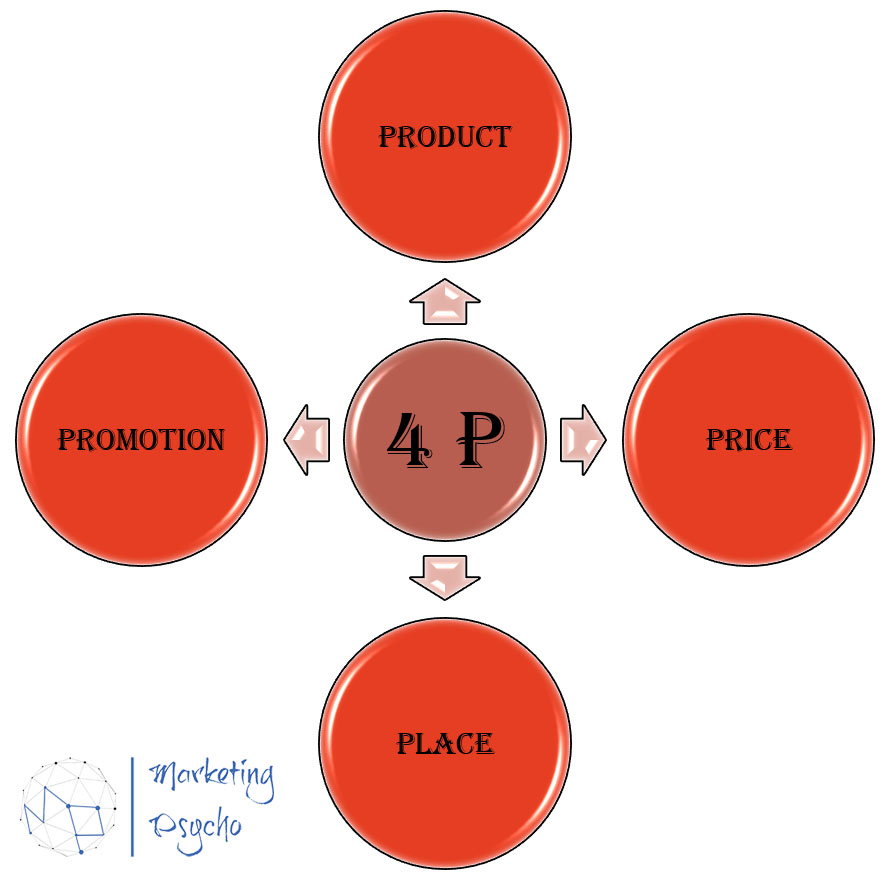Every new product or service that enters the market must be accompanied by a well-designed marketing plan. But despite the efforts made by marketers, often a product or service does not become successful. In his book Ten Deadly Marketing Sins: Signs and Solutions, Philip Kotler analyzed the cause of these failures and brought out the 10 deadly marketing sins that lead to undesirable results, as well as suggested solutions to these problems.
Let’s look at what, in the author’s opinion, are the mistakes of marketers and how to fix them.
Proper marketing involves the following sequence:
- First, marketers search for new opportunities for the company, while they apply STP (segmentation, targeting, and positioning) strategies.
- Next, marketers use the “4 Ps”. At the same time, the elements of the “4 Ps” must match each other and the STP strategy.
The “4 Ps” (also known as Marketing Mix) is a marketing planning model based on 4 basic elements.
Marketing Mix

Product is the goods or services that the company offers, that is, what customers use to satisfy their needs and desires.
Price is a list of pricing, markups, discounts, pricing strategies, and others. The price not only affects the profit that the company will receive but also the perception of the product by the consumer.
Place is sales channels, logistics, distribution, merchandising, and others. Products must be not only in the right place but also at the right time for the consumer to decide to purchase them.
Promotion is advertising, personal sales, exhibitions, presentations, etc., that is, the company’s activity aimed at informing target consumers about the advantages of goods or services, at persuading them to buy this particular product.
To successfully sell a product or service, a marketer must be able to use all four elements of the Marketing Mix
- Finally, after developing the STP strategy and the “4 Ps”, marketing specialists should stick to the plan and track the results. If the results deviate from the planned ones, then corrective actions should be taken.
Unfortunately, at the moment, such a sequence of marketing actions works very rarely. In most cases, companies assign marketing only one function of the “4 Ps” is Promotion.
And even in this situation, CEOs do not fully understand the importance of the marketing function, they only see the costs they spend on promotion, but cannot see the tangible results. They don’t understand what the marketing costs will bring them.
Philip Kotler is convinced that the main focus of marketers should not be on sales, but on creating products that do not need sales work. In his opinion, marketing specialists should be able to identify opportunities, develop, and implement plans that will bring success in the market. He believes that marketing should return to its original role in driving business strategy.
Ten Deadly Marketing Sins
The company is not sufficiently market focused and customer-driven
There are 2 reasons for this sin: either the company does not fully understand the possibilities of its market, or it is not well organized enough to satisfy the target consumers.
Insufficient market focus
| Signs | Solutions |
| poor identification of market segments | adopt more advanced techniques in segmentation, such as benefit segmentation, value segmentation, and loyalty segmentation |
| insufficient prioritization of market segments | prioritize the most important segments |
| no market segment managers | specialize the sales force |
Philip Kotler advises that you should first try to segment the members of the market by needs or benefits, then try to find demographic descriptions that can correlate with these needs and benefits.
Insufficient customer orientation
| Signs | Solutions |
| most employees think that it is the job of marketing and sales to serve the customers | develop a clear hierarchy of company values with customers at the top |
| there is no training program to create a customer culture | engage in activities that will produce more “customer consciousness” in employees and the company’s agent |
| there are no incentives to treat the customer especially well | make it easy for customers to reach the company by phone, fax, or e-mail with inquiries suggestions, and complaints and respond quickly |
Companies must first think about their customers and employees because if they are not satisfied, the company’s activities can stop. Changing a well-established culture and setting the customer’s interests at the center of the company’s attention will require competent and confident new leadership.
Philip Kotler suggests a few steps in this direction
- develop a clear hierarchy of groups and values
- demonstrate how the behavior of each employee of the company can affect customers
- regularly feature findings on customer satisfaction
- sponsor a training program in customer service and satisfaction
- achieve the same attitude to the needs of consumers of their distributors and dealers

The company does not fully understand its target customers
| Signs | Solutions |
| your last study of customers was done three years ago | do more sophisticated consumer research |
| customers are not buying your product at the expected rate; competitor’s products are selling better | use more analytical techniques |
| there is a high level of customer returns and complaints | establish customer and dealer panels |
| install customer relationship management (CRM) software and do data mining |
Research should include formalized methods: focus groups, surveys, depth interviewing, in-home research (when families agree to carry on their usual behavior, including recording their interactions and conversations), in-store research, mystery shopping (hiring people who play the role of buyers and make reports on the behavior of sellers both the company itself and its competitors). In addition to collecting primary data companies need better tools for assessing consumer behavior.
The company needs to better define and monitor its competitors
| Signs | Solutions |
| your company overfocuses on its near competitors and misses distant competitors and disruptive technologies | establish a person or office for competitive intelligence |
| your company lacks a system for gathering and distributing competitive intelligence | hire away people from competitors |
| watch every new technology that might hurt the company | |
| prepare offerings similar to your competitors’ |
The company has not properly managed its relationships with its stakeholders
| Signs | Solutions |
| your employees are not happy | manage employees better |
| you have not attracted the best suppliers | manage supplier relations better |
| you don’t have the best distributors and your dealers are unhappy | manage distributors and dealers better |
| your investors are not happy | manage investors better |
| move from zero-sum thinking to positive-sum thinking |
In successful companies, internal marketing is conducted, each employee is perceived as an individual with their own needs, knowing which the company can better manage staff.
The company is not good at finding new opportunities
| Signs | Solutions |
| your company has not identified any exciting new opportunities in recent years | set up system for stimulating the flow of new ideas from your partners |
| the new ideas that your company has launched have largely failed | utilize creativity systems for generating new ideas |
In most companies, the search for new ideas begins with their own products, which should be changed in some way. Usually, this approach is called vertical marketing, the methods of which are: modulation, sizing, packaging, design, complements, efforts reduction. The main problem with vertical marketing is that it leads to market fragmentation.
Companies should use an alternative idea generation process that Philip Kotler calls lateral marketing. Lateral marketing is a way of analyzing your product as closely related to another product, service, or idea. But you are considering the idea of combining two products, rather than creating another variation of the original product.
In his book Ten Deadly Marketing Sins: Signs and Solutions the author advises companies to do both vertical and lateral marketing if they want to succeed in innovation.
The company’s marketing plans and planning process are deficient
| Signs | Solutions |
| your marketing plan format does not carry the right components or logic | establish a standard plan format including situational analysis, SWOT, major issues, objectives, strategy, tactics, budgets, and controls. |
| your plans lack a means for simulating the financial implications of alternative strategies | ask marketers what changes they would make if they were given 20 percent more budget or 20 percent less budget |
| your plans lack contingency planning | run an annual marketing awards program with prizes going to the best plans and performance |
The company’s product and service policies need tightening
| Signs | Solutions |
| the company has too many products and many are losing money | the company needs to establish a system for tracking weak products and fixing or eliminating them |
| the company is giving away too many services free | the company should offer and price services at different levels |
| the company is poor at cross-selling its products and services cross-selling is a sale in which the product is offered together with additional goods or services | the company should improve its processes for cross-selling and upselling upselling is a sale of alternative products at a higher price |
The company’s brand-building and communication skills are weak
| Signs | Solutions |
| your target market does not know much about your company | improve your brand-building strategies and your measurement of results |
| your brand is not seen as distinctive and better than other brands | Shift money into those marketing instruments that show increasing effectiveness |
| your company allocates its budget to the same marketing tools in approximately the same amount each year | develop a financial mindset in the marketers and require them to estimate the ROI impact in advance of their spending requests |
| you do little evaluation of the ROI impact of your different promotional programs |

The company is not well organized to carry on effective and efficient marketing
| Signs | Solutions |
| the head of marketing does not seem to be very effective | appoint a stronger leader of the marketing department |
| the staff lacks some marketing skills needed in the twenty-first century | build new skills in the marketing department |
| there are bad vibes between marketing/sales and the other departments | improve marketing’s relations with the other departments |
According to Philip Kotler, an effective Chief Marketing Officer (CMO) can perform three tasks at once:
- manage the department successfully, setting high standards for marketing planning and implementation of plans, improving the skills of the staff, forecasting the prospects for further development, and communication;
- gain respect and trust from the heads of other departments, and also to get the organization to serve and satisfy the customers;
- build good relationships with the CEO and executing his orders.
If the CMO does not cope with any of the tasks, the author advises to dismiss him.
Philip Kotler lists the following new skills in marketing:
- positioning
- brand asset management
- database marketing and customer relationship management (CRM)
- partner relationship management (PRM)
- company contact center
- Internet marketing
- PR marketing
- service and experiential marketing
- integrated marketing communications
- profitability analysis
- market-driving skills
The company has not made maximum use of technology
| Signs | Solutions |
| the company has made minimal use of the Internet | make more use of the Internet |
| the company’s sales automation system is outdated | improve the sales automation system |
| the company has not introduced any market automation | apply market automation to routine marketing decisions |
| the marketing group lacks decision-support models | develop some formal marketing decision models |
| the marketing group needs to develop marketing dashboards | develop marketing dashboards |
To take full advantage of the Internet, you can use the following effective tools:
- Website
- Training online
- E-Recruitment
- E-Procurement
- Intranet
- Extranet
- E-Market research
- E-chat rooms
At the end of the book Ten Deadly Marketing Sins: Signs and Solutions, Philip Kotler lists the 10 commandments of marketing effectiveness:
- segment the market: choose the best segments for your company and try to take a strong position in each of them.
- analyze the customers’ needs, perceptions, preferences, and behavior and motivate stakeholders to strive to fully satisfy customer requests.
- study your main competitors, you need to know their strengths and weaknesses.
- establish partnerships with all stakeholders and pay generously for their services.
- develop a system for identifying opportunities, ranking them, and finance the best ones.
- manage a marketing planning system that allows you to make long-term and short-term plans.
- maintain strong control over production and service.
- create strong brands using the most cost-effective communications and promotion tools.
- build marketing leadership in the market, strengthen a team spirit in your company.
- add constantly the latest technology to gain a competitive advantage in the market.
Philip Kotler advises you to adhere to these 10 commandments in order for your marketing activities to be successful. Remember the ten deadly marketing sins listed in this book, and try to avoid these mistakes in your work.
Read more marketing, management and sales Book Reviews in the special section of the website.





